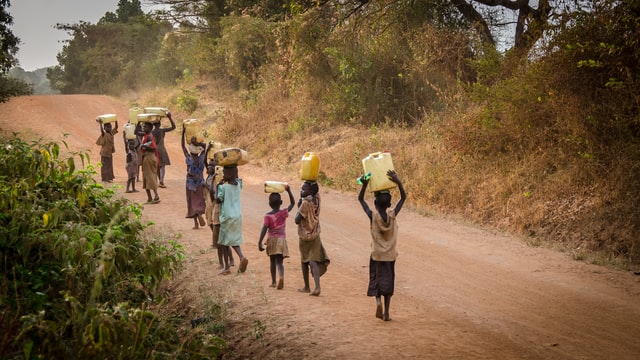Seeking Solidarity: Girls’ Education in Uganda


Catherine, a Secondary Level 4 student, beckoned me to help her through some problematic math questions. How had I been pegged as the person worthy of helping with my worst subject?
She and five other students had just attended an English lesson (which I had prepared at their request) for the express purpose of continuing their education in the middle of a three-week holiday. The lesson focused on how to construct an argumentative essay. That’s right–these students were (and are) spending their free time trying to find as many ways back into the classroom as possible. And Catherine didn’t want the lessons to end.
As I racked my brain for memories of functions and operations, she described to me her “fear of math” and her failure to pass her final examinations the prior year. Despite the difficulties she faced in finding a way to pay the school fees in order to repeat her final year of “O” Level, and despite her teacher’s “encouragement” to drop the subject, Catherine has now successfully completed first term and continues to study tirelessly in the subjects that challenge her the most.
Seeking Solidarity: Girls’ Education in Uganda.
In a school where only nine of the 34 Secondary 4 students are female, Catherine is a force to be reckoned with. She survived the changes and drops over the years; her class entered Level One with roughly 97 students, 36 of whom were girls. Thirty-eight percent of the current student population is orphaned, and only 20 percent of the teaching staff is female. With so many hurdles in the way of obtaining an education, it is a feat for any student–male or female–to complete “O” Level and continue onto “A” Level, which is roughly equivalent to the eleventh and twelfth grades.
Catherine’s eagerness to excel has propelled her past all of the obstacles faced by Ugandan girls trying to complete a basic education. Every student struggles to find a way to pay the school fees and other costs associated with attending. Many students must leave their home hours before the day officially begins to reach school on foot, opening them up to a variety of risks on the way to and from. Beyond these challenges, many of the students–girls in particular–face a “second shift” of chores and responsibilities at home that prevent them from completing assignments or getting a full night’s rest. These are the kind of burdens that lead some, like the head girl of Catherine’s school, to say, “It’s not so good to be a girl.”
Seeking Solidarity: Girls’ Education in Uganda.
But if women set the pace in development, why is this still the case?
Prioritizing girls’ education is not an issue that has just emerged onto the world scene. Malala Yousafzai garnered worldwide attention, but has only been one piece of a larger timeline working towards the end goal of equal education for all. And incidents of denial to this access continue to occur, on both small and large scales.
As I type this, a line of fire is alight in reaction to the disappearance of roughly 270 Nigerian schoolgirls. The U.N. Millennium Development Goals and other international initiatives have all considered girls education as a key aspect of modern development, but as with so much rhetoric, the actual application has fallen short of the ideal.
As a traveler and an impromptu teacher for girls like Catherine, who are defying the expectations of a warped system, I am provided constant reminders of the privilege that was afforded to me throughout my free, public education, and four full, expensive years in university. I’m saddled with debt but lifted up on pedestals. I constantly reflect on the power this privilege gives me, and what role I will play in the unfolding of solidarity that will be found among girls around the world. I look up to girls like Catherine, and can’t wait to see her keep excelling.
Photo credit by Unsplash.







